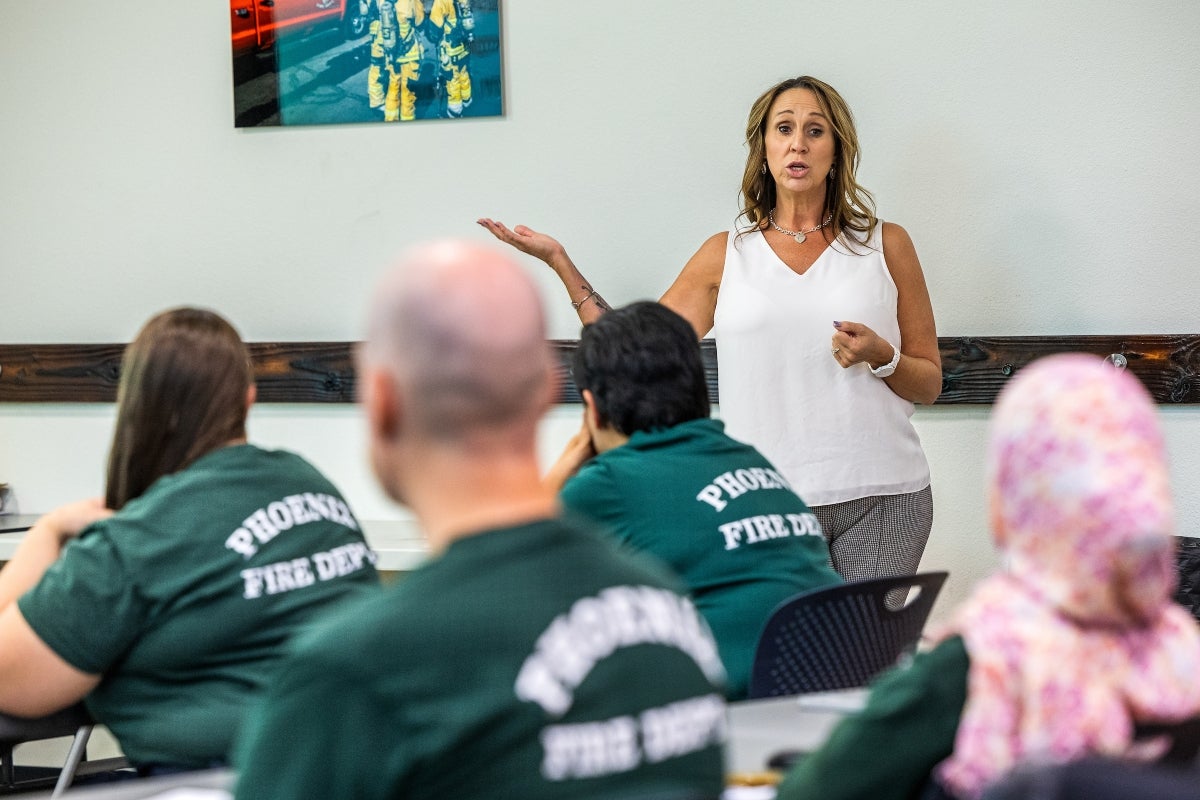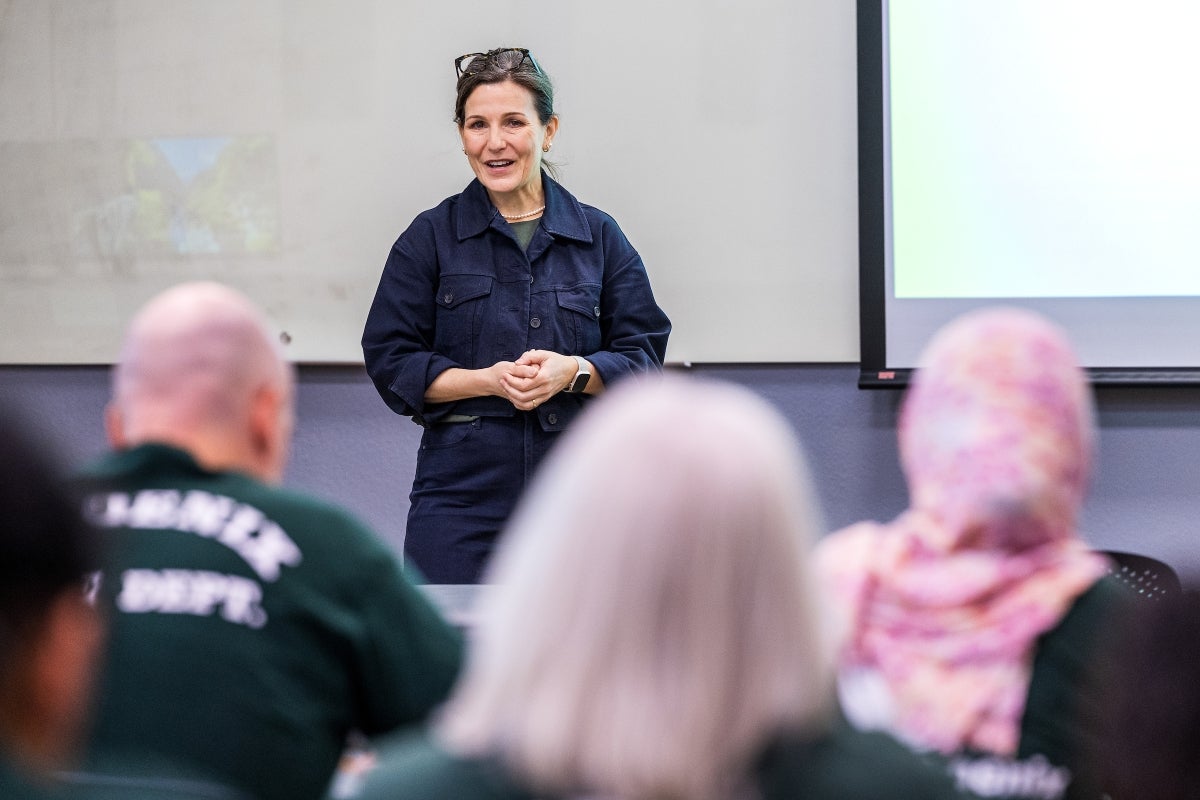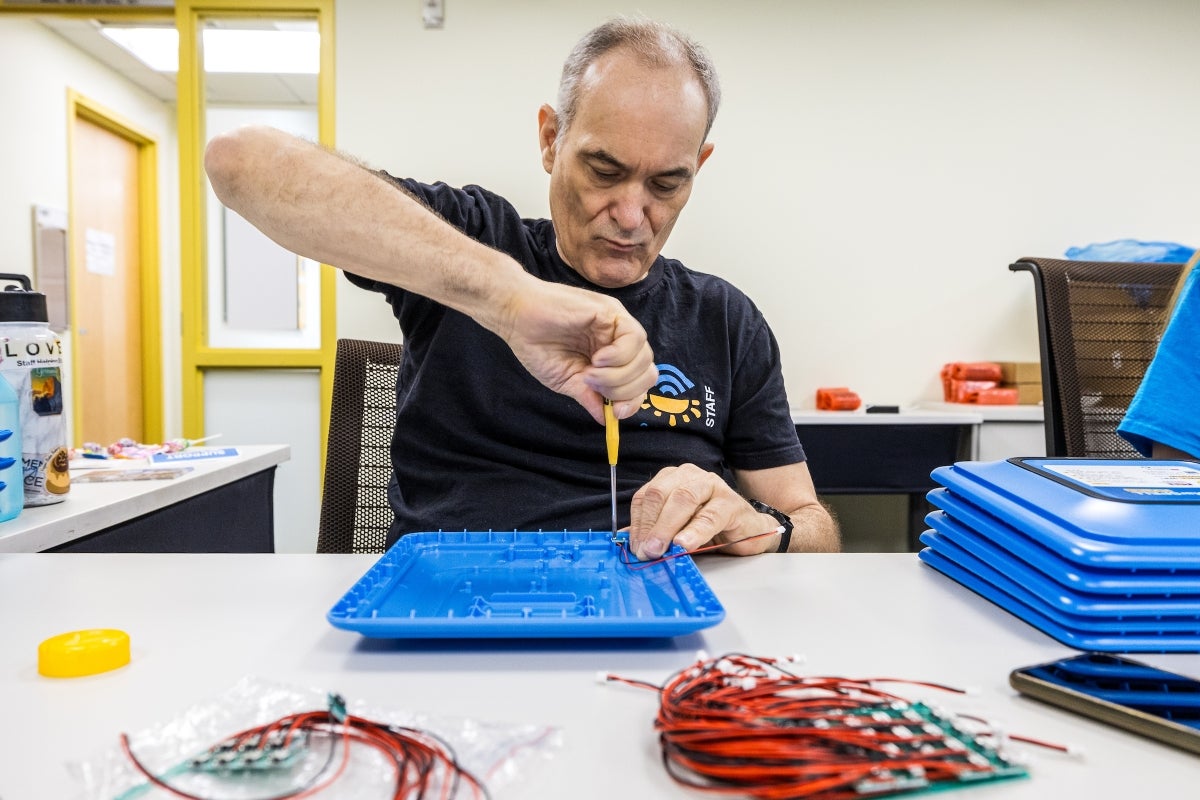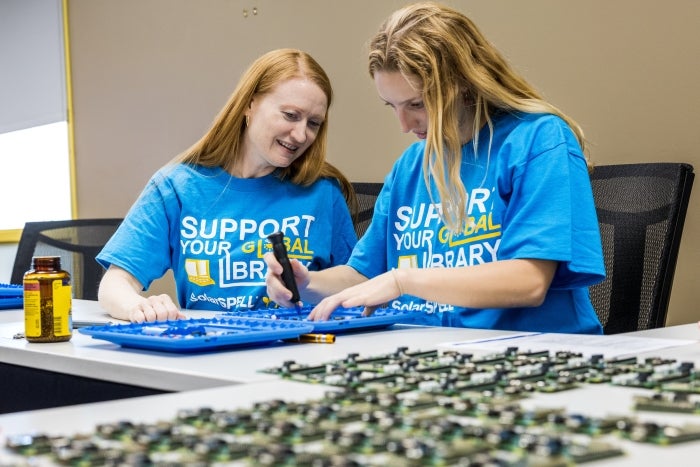ASU-developed SolarSPELL libraries deployed to help communities in Arizona

Rose Escudero (left) and Najma Aidarus, both employees of the Phoenix Fire Department's Community Assistance Program, learn how to download content from a SolarSPELL device during a training session at the department’s special operations facility in south Phoenix. The devices will supply information needed by people in crisis situations. Photo by Charlie Leight/ASU News
SolarSPELL, which started as a student engineering assignment at Arizona State University and grew into a global humanitarian project, is now providing its solar-powered library devices to help people in Arizona.
With projects in 15 countries around the world, most of which have little or no internet access, the initiative founded by two ASU professors recently started working with health care providers on the Hopi reservation in northern Arizona and with the Phoenix Fire Department’s Community Assistance Program.
The two projects are the first time SolarSPELL has been utilized domestically.
Both Arizona-based projects received SolarSPELL devices, which practitioners can use in the field without electricity or internet access. And most importantly, the libraries include vast amounts of information that is carefully customized for each group that uses it.
Earlier this year, the SolarSPELL team traveled to the Hopi Nation to train patient navigators with Hopi Cancer Support Services. The tribe contributed some of the SolarSPELL library content, and Aurelia Taylor, an ASU doctoral student and member of the tribe, created additional information and led the sessions.
Taylor graduated with her Doctor of Nursing Practice degree a few months after the training sessions, which were part of her capstone project. Her work connecting the tribe and providing culturally relevant content via SolarSPELL was critically important to build trust, according to Laura Hosman, co-founder and director of SolarSPELL and an associate professor with a joint appointment in the School for the Future of Innovation in Society and The Polytechnic School.
“The fact that we had the approval from the tribe itself and that all of the content in that library was vetted by the people that they know — that builds trust,” said Hosman, who developed the SolarSPELL initiative with Bruce Baikie, an adjunct faculty member at ASU.
“It’s not just the fact that the internet is expensive and not everybody feels confident in using it, it's also how do they know what to trust once they've found something on the internet? And it's the patient navigators themselves who are bringing this library around, and they were part of creating that library, and so (the patients) know the content is trustworthy.”
Heather Ross, assistant professor in the Edson College of Nursing and Health Innovation and co-director of SolarSPELL Health, said that it’s critical to be sensitive to Hopi traditions around discussions of illness or death.
“With cancer, we often talk about nutrition, and it’s important to be attentive to cultural norms and what's available, and the foods that are part of the Native experience,” she said.
The SolarSPELL project with the Phoenix Fire Department started with Ross, who, as part of her faculty role at ASU, spent time in the Phoenix mayor’s office, which had her ride along with the crisis-response teams.
“I quickly noticed the giant hanging file that takes up a lot of space in the back of the van,” she said.
The files contained hundreds of brochures and info sheets that could be handed out to people, who likely lost much of it as they navigated their crisis.
The SolarSPELL Crisis Response library digitized all of that content, and now it can be downloaded to a tablet or cellphone and is accessible even if there’s no cell service.
It was the capstone of Patricia Inman, a psychiatric nurse and ASU student who is pursuing a DNP with a concentration in family psychiatric and mental health nurse practitioner.
“I enjoy helping people in crisis,” Inman said. “But so many times we see people coming back and coming back, and it’s primarily because they don’t have the information they need. This will make it so much easier.”
In September, Ross and Inman trained several dozen practitioners in the crisis response and behavioral health units of the Phoenix Fire Department in how to use SolarSPELL, and a few weeks later, 10 devices were deployed in the crisis response vans.
Each library is loaded with information in English and Spanish that is used on the scene — such as housing and grief resources, support for victims of domestic violence, basic first aid and various local hotlines.
Some of the information is specific, such as how to ship a body to Mexico or how to prepare for a disaster if a family member has a disability.
The libraries also include a toolkit to deal with children who are present during a crisis.
“People in the CAP program said they sometimes have kiddos on a scene for hours at a time and the best practice to mitigate the traumatic experience is to distract them,” Ross said.
Sometimes the crisis response workers would give children their own phones or tablets to watch YouTube videos. But now they can let the kids use the SolarSPELL devices, which contain child-friendly games, videos and storybooks, and don’t connect to the internet.
SolarSPELL student workers do much of the work developing and curating the library content.
Ross said that most of the information in the old hanging files was written at a ninth-grade level, so the student workers modified it to be comprehensible to a fifth-grade reading level, with more illustrations and simpler language.
“Using documents with a lot of pictures improves outcomes for people — particularly people in high-stress situations,” she said.
The two Arizona projects are both focused on health care, as are those in South Sudan, Malawi and Vanuatu in Oceania. Other SolarSPELL libraries provide content about agriculture — in Rwanda and Zimbabwe — and education — in Oceania, Africa and, starting in 2023, the Autonomous Administration of North and East Syria.
The Autonomous Administration of North and East Syria is a self-governing community that formed in 2012, and includes residents from many different ethnic and religious groups fleeing the civil war. They turned to SolarSPELL for help in creating a K–12 school system. All of the content is translated into the region’s three main languages: Kurdish, Arabic and Syrian.
SolarSPELL, which stands for “Solar Powered Educational Learning Library,” began when Hosman challenged her engineering students to create a solar-powered library that would fit into a backpack.
The devices have a simple and inexpensive design, including a small solar panel. Earlier this year, SolarSPELL unveiled a new design with a streamlined case made of recycled plastic that is more durable and is resistant to shock, heat, dust and water.
The device creates a Wi-Fi hot spot, so no electricity or internet connection is needed. Students then connect any Wi-Fi capable device, such as smartphones, tablets or laptops, to access and download the content.
The SolarSPELL experience includes training, feedback on impact and ongoing updates to the library content.
“Our libraries are never finished,” Ross said.
More Science and technology

Breakthrough copper alloy achieves unprecedented high-temperature performance
A team of researchers from Arizona State University, the U.S. Army Research Laboratory, Lehigh University and Louisiana State University has developed a groundbreaking high-temperature copper alloy…

4 ASU researchers named senior members of the National Academy of Inventors
The National Academy of Inventors recently named four Arizona State University researchers as senior members to the prestigious organization.Professor Qiang Chen and associate professors Matthew…

Transforming Arizona’s highways for a smoother drive
Imagine you’re driving down a smooth stretch of road. Your tires have firm traction. There are no potholes you need to swerve to avoid. Your suspension feels responsive. You’re relaxed and focused on…





